Graham Reid | | 5 min read

There's a strange notion of what passes for singing these days. Blame Whitney Houston if you will, but watch any Idol show and singing seems to have been replaced by a kind of vocal calisthenics where notes are bent and twisted, tossed around with little care where they land, and stretched so that even the most simple phrase can take on an unnatural lifespan.
This is singing as music-wrestling.
But then there's jazz vocalist Kurt Elling from Chicago -- a graduate of his hometown university's school of divinity -- who writes lyrical poetry to the solos of jazz greats like John Coltrane, Joe Zawinul, Pat Metheny, Horace Silver, Herbie Hancock and others. And his style isn't anywhere near as torturous as that sounds - or those young music-wrestlers.
Elling also pens his own material - with longtime musical partner and pianist Laurence Hobgood - and in performance includes poetry by the likes of Allen Ginsberg, Robert Creeley and Walt Whitman to make that connection between the arts.
With six albums for Blue Note (Norah Jones' and Cassandra Wilson's label) behind him, he understands why so many young people go that whole music-wrestling route.
"I don't think about it too much - but people have so much being presented to them, like television, the internet and so on. The progress of society and information is moving so quickly that people don't really have the time, or make the same kind of time, to consider more elaborate artistic statements and have a deeper experience.
"That said, it's an interesting juxtaposition because jazz itself grew out of the increasing complexities of modern society. It grew out of the increasingly industrialised and mechanised World War I and II era, women going into factories, horns honking, radio coming into its own ...
"Jazz really reflects the human artistic spirit trying to digest modern society and be spiritual at the same time."
Elling reflects that overt spirituality was once common in jazz - the spiritual quest of John and Alice Coltrane, Pharoah Sanders and others - and that is what made it so moving. "In the music of Charlie Parker or Charles Mingus' music you hear the broken heart of a man pulling himself up and declaring itself to the world through music."
But the cultural climate has changed and today discussion of spirituality is frequently met with cynicism.
"It's a more secularised society than it was even just 10 or 15 years ago. We're in a post-ecclesiastical society, and that means there isn't the same kind of articulated spiritual statements available to people. That's not in the course of their discussion. But whenever I speak to musicians I hear a very deep sense of spirit that's coming through and is part of a conscious intention.
"But it's not articulated like it has been in the past because that's not an acceptable part of our day to day commerce with one another, which I think is a loss. But it's always the artists who need to be, and usually are, at the forefront of the invention of spirit talk in one way or another.
"There is quite a lot of spirit awareness but it's gone underground by way of people not declaring it. Even though artists are at the forefront of society they are also part of it, and the habit of declaring such things is falling away. I do my best to lift people up and I'm conscious of what the possibilities are in a spiritual sense on a given evening.
"But I'm also aware how I could be perceived as ... Well, full of shite actually. I need to be very careful, there is a quite a lot of cynicism in our society, but ultimately I can only rest on what I bring to the table."
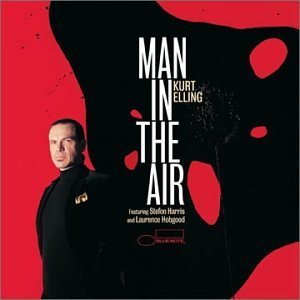 What Elling brings is often complex
narratives and lyrical structures to the music but frequently
delivered as another instrument in the band.
What Elling brings is often complex
narratives and lyrical structures to the music but frequently
delivered as another instrument in the band.
On his most recent album Man in the Air he adopts the woody tone of a saxophone or, on his multitracked treatment of Herbie Hancock's A Secret I, the sound of an electronic keyboard.
With his longtime band led by pianist cowriter Hobgood he essays jazz solos in the human voice.
"I suppose I'm an instrumentalist although there is quite a lot of lyrical information happening, but the concept of interaction at the level of musicianship is important to me. I don't think I'm consciously thinking that one thing is an instrumental idea or another a singer idea, I just try to play as well as I can."
And you just said "play"?
"There you go," he laughs.
For all his high-minded thoughts on spirituality, Elling is personable and good- humoured. He speaks of the difficulties of transcribing solos given he isn't a music graduate, and how often the notes you might think are there simply aren't. Melodic nuances can go past the ear and are only acknowledged intuitively. He grapples with writing lyrics appropriate to the melody and its emotional content, and admits he's sometimes given up when the solo doesn't lend itself to his words.
"There may be so many slurs or runs that I can't decipher what is happening. When you listen to music you think you hear what is happening, but especially in jazz things are much more challenging and thought through by the original artist. I don't want to say it's complicated because that's off-putting, but it's much more challenging to your mind."
And as part of giving himself and his audience a challenge in a performance he will include appropriate pieces of poetry "to move people or get them to think, and also spark a good conversation".
"I like the idea of people going home thinking, 'Wow, what was that?' I think the deeper an experience I can give, the more extravagant possibilities of creativity I can confront people with, the longer that conversation is going to be.
"We're evolving in the direction of mechanical and technological interaction and so the majority of the brainpower of the First World is, 'How can I get a smaller, faster phone for a better rate?' People aren't focused on, 'How can I live a more peaceful existence?' and that's the kind of thing poetry demands, that you slow down and to consider."
He admits that a few years ago when he was signed to Blue Note six weeks after the label heard a demo tape, things were moving so fast he too had little time to slow down and consider. Now 35, and with the gift of hindsight, can he see what was happening to him at the time?
"There's a hunger for the new and striking in the music industry and for a minute there I had the chance to be that," he laughs. "I'm now not quite as young but I still think pretty striking when it comes to the musical experience. It was almost too much too soon, given how much I had to learn about the music and being a band leader.
"Everything I've done has been a trial by fire and I've survived, but I certainly won't get that chance to be the new kid again, so now I have to pace myself.
"But that's fine, this is jazz and that's a music that demands your whole life."
Like the sound of this? Then check out this.

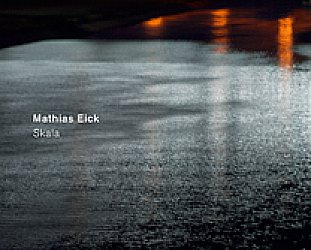
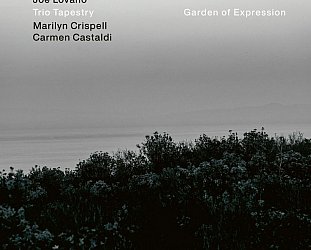
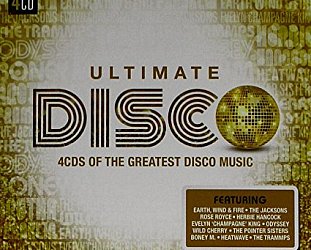
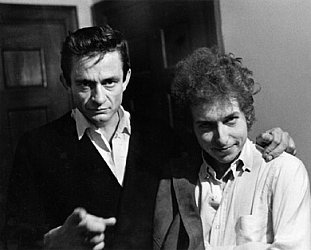
post a comment